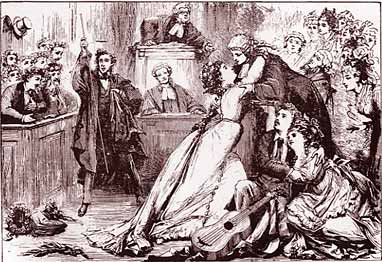You are here: > > Introduction

On 25 March, 1875 "Trial by Jury" which is a dramatic cantata in one Act, was produced at the Royalty Theatre and was played after Offenbach's three-act comic opera, "La Perichole". The Royalty Theatre was under the management of Madame Selina Dolaro, whose manager was Mr. Richard D'Oyly Carte, and it is to the latter's initiative in following up his conviction that Gilbert and Sullivan would make a success in collaboration that we owe the long string of comic operas which have given such pleasure over a number of years to countless thousands and, it is to be hoped, will continue to do so for many years to come.

The opera opens with the Usher reminding the jury that the breach of promise action which is about to be heard must be tried without prejudice of any kind, but nevertheless a few moments later he tells them that when the ruffianly Defendant speaks—"What he may say you need not mind, from bias free of every kind this trial must be tried!" and when Edwin, the unfortunate Defendant, is pleading his case against the beautiful Plaintiff, Angelina, the Jurymen turn their backs and refuse to listen.
Soon the learned judge appears and tells the Court, in his famous song, "When I, good friends, was called to the bar", how he came to be a judge.
Angelina is then summoned, but before she appears a bevy of beautiful bridesmaids come tripping into Court to the accompaniment of one of Sullivan's most lilting airs.
The judge, having taken a great fancy to the first bridesmaid, sends her a note by the Usher which she kisses rapturously, and places in her corsage, but when the judge sees Angelina, who enters shortly afterwards in her full bridal dress and looking very lovely, he hastily transfers his admiration to her and directs the Usher to take the note from the first bridesmaid and hand it to the Plaintiff who, in her turn, reads it, kisses it rapturously and places it in her corsage.
As Edwin still refuses to marry Angelina despite her entreaties—"I love him—I love him—with fervour unceasing, I worship and madly adore"—the gallant judge comes to the rescue and offers to marry her himself.
The opera closes as the judge steps down from the Bench to the floor of the Court and joins in the gay dance of the Finale—"Oh, joy unbounded".
Mr. D'Oyly Carte was instrumental in forming the Comedy Opera Company of which he was the Manager. This Company provided the necessary funds and produced "The Sorcerer" and "H.M.S. Pinafore", after which the Company came to an end owing to difficulties arising between the partners. Then began the great triumvirate of Gilbert, Sullivan and D'Oyly Carte.
"Trial by Jury" is of interest in many ways. It is the only Gilbert and Sullivan opera which is sung throughout, and when first produced Frederick Sullivan, the composer's brother, took the part of the judge. Frederick died on 18 January, 1877, when Sullivan wrote "The Lost Chord" in memory of his brother to whom he was greatly attached.
A few weeks after the opening night W. S. Penley joined the cast and played the small part of the Foreman of the jury; later he became very well known for his acting in "The Private Secretary" and in "Charley's Aunt".
The scene is laid in the Court of the Exchequer and the plot consists of a breach of promise case. A member of the audience may well wonder what he is doing in a Court of "Exchequer" when he has come to hear a breach of promise case but, needless to say, Gilbert as usual is quite accurate and at the time he wrote the opera this Court, absurd though it may sound, did try breach of promise cases.
As its name denotes the Court of Exchequer was a revenue court; in fact, it originally started about the time of Henry II as a ministerial bureau whose duty it was to collect the King's revenue then, as this naturally involved the decision of legal questions in which the King claimed payment of his debts, the Exchequer eventually became a Court of Law.
Gradually this court increased its jurisdiction by trying civil cases which were really in no sense revenue cases until, in Gilbert's day, a breach of promise case could be tried there by the aid of the legal fiction that the wrong done, as in the opera, to the young girl Plaintiff by the heartless conduct of the Defendant rendered her unable to pay her taxes to the King.
Page updated 10 November 2004